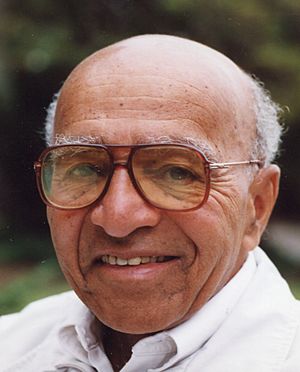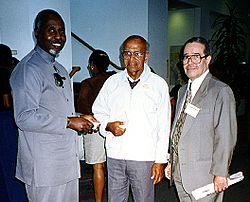David Blackwell facts for kids
Quick facts for kids
David Blackwell
|
|
|---|---|

Blackwell in 1999
|
|
| Born |
David Harold Blackwell
April 24, 1919 Centralia, Illinois, U.S.
|
| Died | July 8, 2010 (aged 91) Berkeley, California, U.S.
|
| Nationality | American |
| Education | University of Illinois at Urbana-Champaign (BA, PhD) |
| Known for | Rao–Blackwell theorem Blackwell channel Arbitrarily varying channel Games of imperfect information Dirichlet distribution Bayesian statistics Mathematical economics Recursive economics Sequential analysis |
| Awards | Member of the National Academy of Sciences (1965) John von Neumann Theory Prize (1979) R. A. Fisher Lectureship (1986) |
| Scientific career | |
| Fields | Probability Statistics Logic Game theory Dynamic programming |
| Institutions | University of California, Berkeley |
| Thesis | Some properties of Markoff chains (1941) |
| Doctoral advisor | Joseph Leo Doob |
| Notable students | Roger J-B Wets |
David Harold Blackwell (April 24, 1919 – July 8, 2010) was an American statistician and mathematician who made significant contributions to game theory, probability theory, information theory, and Bayesian statistics. He is one of the eponyms of the Rao–Blackwell theorem. He was the first African American inducted into the National Academy of Sciences, the first black tenured faculty member at the University of California, Berkeley, and the seventh African American to receive a Ph.D. in Mathematics.
Blackwell was also a pioneer in textbook writing. He wrote one of the first Bayesian textbooks, his 1969 Basic Statistics. By the time he retired, he had published over 90 books and papers on dynamic programming, game theory, and mathematical statistics.
Contents
Education and early life
David Harold Blackwell was born on April 24, 1919, in Centralia, Illinois, to Mabel Johnson Blackwell, a full-time homemaker, and Grover Blackwell, an Illinois Central Railroad worker. He was the eldest of four children. Growing up in an integrated community, Blackwell attended "mixed" schools, where he distinguished himself in mathematics. During elementary school, his teachers promoted him beyond his grade level on two occasions. It was in a high school geometry course, however, that his passion for math began. An exceptional student, Blackwell graduated high school in 1935 at the age of sixteen.
Blackwell entered the University of Illinois at Urbana-Champaign with the intent to study elementary school mathematics and become a teacher. In 1938 he earned his bachelor's degree in mathematics and a master's degree in 1939, and was awarded a Doctor of Philosophy in mathematics in 1941 at the age of 22, all by the University of Illinois. Blackwell was a member of the Alpha Phi Alpha fraternity.
Career and research
Blackwell did a year of postdoctoral research as a fellow at Institute for Advanced Study (IAS) in 1941 after receiving a Rosenwald Fellowship. There he met John von Neumann, who asked Blackwell to discuss his Ph.D. thesis with him. Blackwell, who believed that von Neumann was just being polite and not genuinely interested in his work, did not approach him until von Neumann himself asked him again a few months later. According to Blackwell, "He (von Neumann) listened to me talk about this rather obscure subject and in ten minutes he knew more about it than I did."
He departed when he was prevented from attending lectures or undertaking research at nearby Princeton University, which the IAS has historically collaborated with in research and scholarship activities, because of his race.

Seeking a permanent position, he wrote letters of application to 105 historically black colleges and universities. He felt at the time that a black professor would be limited to teaching only at black colleges. He also sought a position at the University of California, Berkeley, and was interviewed by statistician Jerzy Neyman. While Neyman supported his appointment, Griffith C. Evans (the head of the mathematics department) objected, citing the concerns of his wife. It was customary for them to invite all the members of the department over for dinner and "she was not going to have any darkie in her house."
Howard University
He was offered a post at Southern University at Baton Rouge, which he held in 1942–43, followed by a year as an Instructor at Clark College in Atlanta. He then moved to Howard University in 1944 and within three years was appointed full professor and head of the Mathematics Department. He remained at Howard until 1954.
From 1948 to 1950, Blackwell spent his summers at RAND Corporation with Meyer A. Girshick and other mathematicians exploring the theory of duels. In 1954 Girshick and Blackwell published Theory of Games and Statistical Decisions.
Blackwell wrote one of the first Bayesian textbooks, his 1969 Basic Statistics. Blackwell's Basic Statistics inspired the 1995 textbook Statistics: A Bayesian Perspective by the biostatistician Donald Berry.
University of California, Berkeley
He took a position at the University of California, Berkeley as a visiting professor in 1954, and was hired as a full professor in the newly created Statistics Department in 1955, becoming the Statistics department chair in 1956. He spent the rest of his career at UC Berkeley, retiring in 1988.
In 2018, UC Berkeley named an undergraduate residence hall in his honor. David Blackwell Hall opened in Fall 2018.
Honors and awards
- Invited Speaker at the International Congress of Mathematicians, 1954
- President, Institute of Mathematical Statistics, 1956
- Elected a member of the National Academy of Sciences (NAS) 1965
- Elected a member of the American Academy of Arts and Sciences (AAAS) 1968
- President of the Bernoulli Society for Mathematical Statistics and Probability, 1975-1977
- Honorary Fellow of the Royal Statistical Society (RSS) in 1976
- Vice President of the American Statistical Association (ASA) in 1978
- Awarded John von Neumann Theory Prize in 1979
- Awarded the R. A. Fisher Lectureship in 1986
- The Berkeley Citation, 1988
- 2002 class of Fellows of the Institute for Operations Research and the Management Sciences
- National Medal of Science (posthumously), 2012
- The Blackwell-Tapia prize is named in honor of David Blackwell and Richard A. Tapia.
On 3 October 2014, President Obama awarded Dr. Blackwell with the National Medal of Science posthumously. The award was accepted by two of his children, Hugo Blackwell and Sara Blackwell Hunt.
Personal life and death
Blackwell married Annlizabeth Madison (1919–2006), a 1934 graduate of Spelman College, on December 27, 1944. They had eight children together.
David Blackwell died of complications from a stroke on July 8, 2010, at Alta Bates Summit Medical Center in Berkeley, California.

